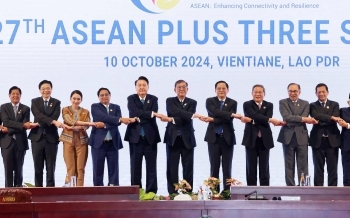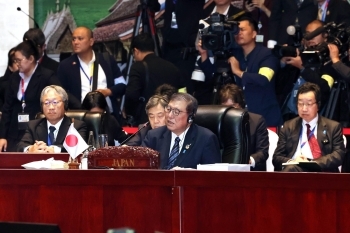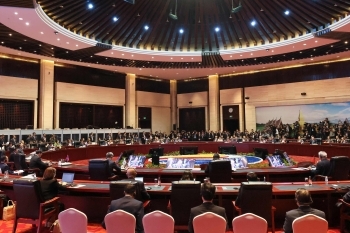Japan-ASEAN Relations
The 27th ASEAN Plus Three (Japan-China-Republic of Korea) Summit
October 10, 2024
 (Photo: Cabinet Public Affairs Office)
(Photo: Cabinet Public Affairs Office)
 (Photo: Cabinet Public Affairs Office)
(Photo: Cabinet Public Affairs Office)
 (Photo: Cabinet Public Affairs Office)
(Photo: Cabinet Public Affairs Office)
On October 10, commencing at 2 p.m. local time (4 pm, JST) for approximately 90 minutes, the 27th ASEAN Plus Three (Japan-China-Republic of Korea) Summit was held in Vientiane, Lao PDR. Mr. ISHIBA Shigeru, Prime Minister of Japan, attended the meeting. The overview of the meeting is as follows.
1. Opening Remarks
Prime Minister Ishiba delivered remarks outlined as follows:
- ASEAN+3 was established in 1997 in the wake of the Asian financial crisis and has played an important role in practical cooperation to strengthen the safety net in the region.
- This region is rich in diversity and a dynamic growth center of the global economy. The total GDP of Japan, China, the ROK and ASEAN accounts for more than 25% of the world's total GDP, indicating that there is great potential for ASEAN+3 cooperation.
- Japan is committed to further promoting ASEAN+3 cooperation for the stability and prosperity of the region, and to working together with the ASEAN+3 countries to shape and safeguard the future.
- As for specific initiatives, Japan has led the establishment of the Rapid Financing Facility under the Chiang Mai Initiative Multilateralization, and the Japan-led Disaster Risk Financing will contribute to the rapid recovery of the disaster affected countries.
- Japan has also been playing a leading role in the framework of ASEAN+3 Emergency Rice Reserve, and Japan will lead discussions on cooperation in the area of food security, including the strengthening of the organization of the ASEAN Food Security Information System.
- Japan will dispatch Japanese experts to the ASEAN Coordinating Centre for Humanitarian Assistance on Disaster Management.
- Japan has consistently supported ASEAN unity and centrality as well as the ASEAN Outlook on the Indo-Pacific (AOIP).
- The principles of the AOIP, such as openness, transparency, inclusiveness, and respect for international law, are particularly important in times of increasing uncertainty. Japan will continue to vigorously push for mainstreaming of the AOIP.
2. ASEAN+3 Cooperation
- Prime Minister Ishiba gave remarks outlined as follows:
- Japan strongly supports the theme of this year's Chair, “Enhancing Connectivity and Resilience”.
- Japan is working to develop quality and resilient infrastructure, in both hard and soft aspects, under the Japan-ASEAN Comprehensive Connectivity Initiative. Japan will also promote cooperation on emerging issues such as Green Transformation (GX) and Digital Transformation (DX), and strengthen regional connectivity and resilience in this regard.
- Japan will also work to strengthen the region’s resilience in the area of infectious diseases including through the dispatch of Japanese experts to the ASEAN Centre for Public Health Emergencies and Emerging Diseases.
- Japan is committed, as the Chair of the Japan-China-ROK Trilateral Process, to pressing forward with the trilateral cooperation together with the ROK and China in a way that is conducive to ASEAN.
- Other participating countries mentioned their own initiatives and their priority areas of cooperation, and expressed their hope for the ASEAN+3 cooperation.
3. Regional and international issues
- Prime Minister Ishiba delivered remarks outlined as follows:
- The security environment in the region is becoming increasingly severe. Any unilateral attempt to change the status quo by force or coercion is unacceptable anywhere in the world. It is essential to maintain and strengthen a free and open international order based on the rule of law for the stability and prosperity of the region.
- Japan is seriously concerned about the advancement of North Korea’s nuclear and missile activities in violation of UN Security Council resolutions.
- Peace and stability of the Korean Peninsula are of our common interest. In order to uphold the international non-proliferation regime, a robust response of the international community including full implementation of UN Security Council resolutions toward the complete denuclearization of North Korea is important.
- Japan also calls for the continued understanding and cooperation from participating countries toward the immediate resolution of the abductions issue.
- Other participating countries touched on the situation in Myanmar, the importance of the denuclearization of the Korean Peninsula.

